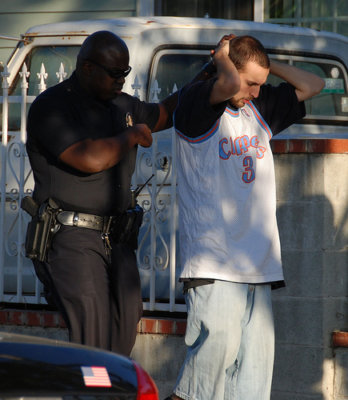What is Antisocial Personality Disorder?

By: Paul Stevenson
Personality disorders are mental health conditions that manifest in the way someone thinks, feels and acts about others, and in how they perceive reality.
The topic of personality disorders is something of a controversy in recent years. The DSM (Diagnostic and Statistical Manual of Mental Disorders, a guide created and used in the United States by mental health professionals) slots human personalities into ten categories. The argument is that people are too complex to so easily label. To give someone the psychiatric diagnosis of a personality disorder can lead to stigma for the individual and their family.
But on the other hand, a diagnosis of a personality disorder gives mental health professionals a necessary shorthand to understand and talk about a problem. Then they can better help the individual in question.
What is Antisocial Personality Disorder?
Antisocial Personality Disorder (ASPD) is defined by the American Psychiatric Association as “a pervasive pattern of disregard for, and violation of, the rights of others that begins in childhood or early adolescence and continues into adulthood.”
Antisocial personality disorder is one of the most challenging of all the personality disorders, involving out of control and irresponsible behaviour that totally disregards others and is often criminal.
But like all personality disorders, there is a spectrum involved. When you trying to define antisocial behaviour keep in mind that some who have ASPD might just exhibit occasional reckless behaviour, while others are constantly committing serious crime including murder.
The mistake made about antisocial personality disorder is to think that it makes someone, well, anti-social. Some people with ASPD are incredibly charming and seem to have high end social skills. What is anti social is rather the lack of respect for others’ wellbeing.
Famous People with ASPD (or Infamous)
Famous cases of ASPD have included Anders Behring Breivik and Aileen Wuornos. Others thought to have Antisocial personality disorder include Jeffrey Dahmer and Ted Bundy.
What Might Someone With ASPD Act Like?
Generally speaking, an individual suffering from ASPD will exhibit personality traits like the following:
 a lack of conscience
a lack of conscience- no interest in others’ feelings
- often blame others and don’t suffer guilt
- no respect for others including no respect for authority
- they can form relationships easily as they can be charming, but have an inability to sustain them
- a strong belief that conventional morality and social norms do not apply to them
- no interest in doing what it takes to fit in to social situations and workplaces
- a belief others people are weak and deserve to be taken advantage of
- a tendency to lie, cheat and manipulate even if it leads to imprisonment
- don’t learn from punishment
- an inability to think through consequences before taking action
- substance misuse and alcoholism
- all consuming tension and boredom
- often cruel to animals
But Those Symptoms of ASPD Sound Like Someone I Know…
Don’t jump to conclusions. The tricky thing with personality disorders is that when we read descriptions about them it’s easy to recognise our own or others’ personality traits. Also, many of the above traits cross over into the personality disorders such as narcissistic personality disorder, so it’s not cut and dry.
It’s important to keep in mind that someone with a personality disorder with exhibit the extremes of any referenced symptoms, enough to cause significant destruction to the their life and those of people around them. And despite it being easy to think we know people who fit the above, only 3% of men and 1% of females are thought to have ASPD.
To understand Anti Social Personality Disorder, it can be helpful to look at the exact requirements needed for an actual diagnosis.
How is Antisocial Personality Disorder Diagnosed?

By: Chris Yarzab
If you were to ask the DMS (4th edition) “what is antisocial personality disorder”, you’d find it requires the below to be present to make a proper diagnosis:
There is a pervasive pattern of disregard for and violation of the rights of others occurring since age 15 years, as indicated by three or more of the following:
- Failure to conform to social norms with respect to lawful behaviours as indicated by repeatedly performing acts that are grounds for arrest;
- Deception, as indicated by repeatedly lying, use of aliases, or conning others for personal profit or pleasure;
- Impulsiveness or failure to plan ahead;
- Irritability and aggressiveness, as indicated by repeated physical fights or assaults;
- Reckless disregard for safety of self or others;
- Consistent irresponsibility, as indicated by repeated failure to sustain consistent work behaviour or honour financial obligations;
- Lack of remorse, as indicated by being indifferent to or rationalizing having hurt, mistreated, or stolen from another.
Furthermore, for an ASPD diagnosis someone must be at least 18 years old. There must also be evidence that before they were 15 they had what’s known as “conduct disorder”. Conduct disorder is a set of behavioural problems where a child is defiant, antisocial and aggressive in a way that is very different from other children of their age. It includes difficulty with authority, cruelty to animals, and arson.
ASPD must also be consistent. Some people who suffer from schizophrenia or mania might exhibit the symptoms above when they are having episodes, but would not then be diagnosed as an ASPD sufferer.”
In general, ASDP tends to strike sufferers with full force in their teens and twenties.
Related Mental Health Problems

By: ZERO+
Such is the nature of personality disorders that they often come hand in hand with other mental health challenges. Here are other emotional health issues that are also commonly found in ASPD sufferers:
- Anxiety disorders
- Depressive disorder
- Substance-related disorders
- Somatization disorder
- Attention deficit hyperactivity disorder
- Borderline personality disorder
- Histrionic personality disorder
- Narcissistic personality disorder
How is Antisocial Personality Disorder Different than Being a Psychopath?
One school of thought is that they are the same, with ASPD a more modern term for sociopathy and psychopaths. It’s important to remember that ASPD is a term made up by the DSM in an effort to label a series of behaviours. There is similarity between their diagnostic criteria for ASPD and for previous definitions of sociopaths and psychopaths.
Essentially they are overlapping terms and constructs. You can have ASPD and be a psychopath, and in fact a lot of psychopaths qualify for ASPD.
ASPD is more common and requires that you had serious conduct issues as an adolescent. Whereas, to be labelled a psychopath, you don’t have to have had problems as a teen. Also, ASPD is more behaviour-based, and psychopathy is more about personality traits.
Don’t forget, looking above at the diagnostic criteria put out by the DSM, someone only needs 3 of the signs to qualify for ASPD. So he might have been a teen boy who was part of a rough crowd and grew up with anti social parents, but he might not have the total lack of empathy like a psychopath always will.
It’s also interesting to note that ASPD is different then a lot of mental disorders because it doesn’t involve a break with reality. Antisocials know what’s going on, they know what is right and wrong according to society, they just are more focussed on their own self-centred desires.
What causes Antisocial Personality Disorder?
It’s not really known why some people develop antisocial personality disorder, but it’s thought to be a mix of biology and environment. In other words, there is a genetic element, but it also relates to childhood.
Biological Factors
 Traumatic experiences can trigger a latent predisposition to ASPD. There can be a disruption of the development of the central nervous system. Hormones and neurotransmitters are also two of the things at play with ASPD. There tends to be lower levels of serotonin in those who have ASPD, something that can result in impulsiveness and agression.
Traumatic experiences can trigger a latent predisposition to ASPD. There can be a disruption of the development of the central nervous system. Hormones and neurotransmitters are also two of the things at play with ASPD. There tends to be lower levels of serotonin in those who have ASPD, something that can result in impulsiveness and agression.
Environmental and Social Influences
Someone with Antisocial Personality Disorder will often have had very dysfunctional parenting growing up. Perhaps their parent was excessively hard on them, withheld affection, or was unpredictable. There was often abuse of some kind. It’s also quite common for someone with ASPD to have have an antisocial or alcoholic parent.
Some have argued that the declining influence of social structures like religion, accompanied by society becoming more about the cult of the individual, have made those prone to ASPD more likely to develop the disorder.
Are there any treatments for Anti Social Personality Disorder?
ASPD is considered to be the most difficult personality disorder to treat. Individuals with ASPD can be charming and dishonest, declaring their commitments to change but often lacking in motivation and intent to do so. And they are very unlikely to seek therapy of their own accord, but more likely to do so only if ordered to.
Once thought a life long situation, ASPD is now seen as treatable, with behaviour improving with psychotherapy. The newest form of psychotherapy, Cognitive Behavioural Therapy, is also now being used. It is, however, likely that certain traits of ASPD will remain despite therapy, like the person having trouble feeling sensitive to others needs.
Some research has shown that ASPD might be preventable, if children who have conduct disorder are identified and helped. Sadly, not enough research has been done to mean that many programs are in place to utilise this tactic, which is a shame, given that ASPD is behind a lot of violence and crime and working with such children could have a marked affect on society.
References
American Psychiatric Association. (2000). Diagnostic and Statistical Manual of Mental Disorders, Fourth Edition, Text Revision. DSM-IV-TR.
Benjamin, L.S.(2003). Interpersonal Diagnosis and Treatment of Personality Disorders: Second Edition. Guildford Press.
Black, D. & Larson, C. (2000). Bad Boys, Bad Men: Confronting Antisocial Personality Disorder. OUP USA.
Dobbert, D. (2010). Understanding Personality Disorders: An Introduction. Rowan & Littlefield Publishers.
Emmelkamp, P. & Kamphius, J. (2007). Personality Disorders: Clinical Psychology: A Modular Course. Psychology Press.
McGregor, J., & McGregor, T. (2013). The Empathy Trap: Understanding Antisocial Personality Disorder. Sheldon Press.
National Collaborating Centre for Mental Health. Antisocial Personality Disorder: The NICE Guidelines on Treatment, Management and Prevention. British Psychological Society and RCPsych Publication.
Wolman, B. Antisocial Behaviour : Personality Disorder from Hostility to Homicide. Prometheus Books.
Have a question still about what is antisocial personality disorder? Comment below, we love to hear from you. And to always know when we post useful articles like this, sign up for alerts. You’ll also receive our monthly newsletter full of useful tips to increase your emotional wellbeing.





Hi is there a blog where I can post or sometimes went how I feel when a family member lies, is abusive, threatens and then the next minute or so behave completely normal; and I’m hating it!
I’m tired of her calling me gay, and that I’m a prostitute and that in my past lives I have had men do things to me or random stuff that I cannot comprehend and she is extremely abusive as well.
She’s also paranoid about people coming to harm her and her children because they have been trying to harm her since years now. These people were people she knew however so I don’t know what that story is exactly but she’s convinced me and my parents are not supportive of her and want to harm her or her children; this ofcourse isn’t true. We just have an intense anger and bitterness towards her now cos she is so disrespectful and uncaring and controlling. I for one am extremely hurt, angry and bitter with her at the moment and do not talk to her really cos I find no meaning in doing so. She always is thinking about herself and her agendas.
This is really a lot of anger, and in some ways it’s understandable. It can be hard when people don’t act in ways we want or understand or in ways that are volatile or a bit off kilter. At the same time, it sounds like your family member has really suffered some kind of trauma that has left her with severe anxiety and paranoia, or even that she has some kind of mental health break going on. Nobody acts in such ways just for fun, but generally as a response to difficult experiences that overwhelmed them. When people are in pain or having a form of mental breakdown they can come across as selfish as they lose their ability to see a bigger picture. Such people actually don’t need fury and judgement, but love and support. If you can’t offer that, as you, fair enough, just feel too close to the situation and have your own issues to deal with (which it sounds like you do), then it might be best for all involved if you agree, without malice but for the best of all, to put some space between you. Otherwise, we’d suggest it might be a helpful tool in life to learn to try and see others perspectives. Reading our article on perspective could be a good start https://www.harleytherapy.co.uk/counselling/what-is-perspective.htm